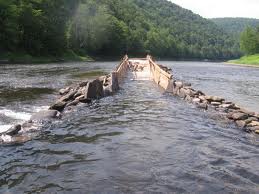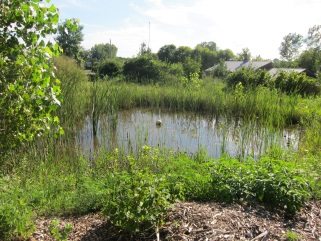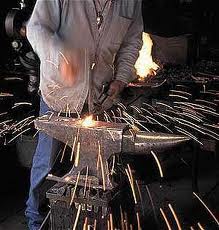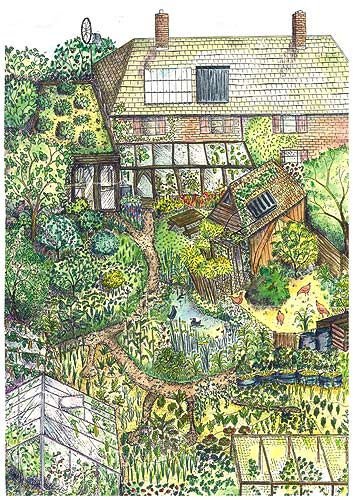Preserving the Past to Serve the Future
Fourth in a Series
Permaculture News has reposted Wellbeing Farm
After leaving the Mid-Atlantic Transition Hub Waterways Reskilling gathering held on November 23, 2013 I realized that the practitioners who attended and spoke – the Transitioners and Permaculturists, the farmers, millwrights, boat builders, fishermen,  engineers, woodworkers, and sail freighters require a community, a physical location, a place to have re-skilling workshops, to teach classes,to hold gatherings, to take on apprentices, and to build real world solutions for the coming post carbon, Slow Tech era.
engineers, woodworkers, and sail freighters require a community, a physical location, a place to have re-skilling workshops, to teach classes,to hold gatherings, to take on apprentices, and to build real world solutions for the coming post carbon, Slow Tech era.
Slow Technology or “Slow Tech” has its roots in the ideological movement called “appropriate technology,” a term coined by E.F. Schumacher in his book Small is Beautiful, first published in 1973. Slow Tech should be thoughtful about how devices shape our relationships to time, emotion, energy, and bioregional environment.
A Vision for Wellbeing Farm
This concept is called Wellbeing Farm because wellbeing is the state of being happy, healthy, or prosperous. It will be a physical place where Permaculture, an approach to designing human settlements and agricultural systems that reflect the natural world – and Transition where these principles are applied to the dual challenges of climate change and peak oil come together to address themes of energy production, health and wellness, education, economics, and food production and distribution at the community and local level.
Wellbeing Farm will give a physical presence to moving beyond ‘environmental’, ’sustainable’, ‘eco’ this or that. The work is about transitioning to where we want to get to,  how do we do it, what we would like it to be and look like when we arrive – while giving people the tools to create more sustainable ways of living in community. It is also about how to design this transition in such a way that people will embrace it as a collective adventure, as a common journey, and as something positive – to design fossil fuel descent pathways which make people feel alive, positive and included in the process of societal transformation.
how do we do it, what we would like it to be and look like when we arrive – while giving people the tools to create more sustainable ways of living in community. It is also about how to design this transition in such a way that people will embrace it as a collective adventure, as a common journey, and as something positive – to design fossil fuel descent pathways which make people feel alive, positive and included in the process of societal transformation.
Wellbeing farm will be a center for Permaculture, the crafts of Transition, and for re-skilling for a post carbon world, where demonstrations of the efficacy of producing local food and power can take place, and a place that can provide opportunities for practitioners to have the time and space to develop specific implementable ideas for a world in transition from extraction and growth to a steady state economy.
Four complementary directions for Wellbeing Farm
- That it be replicable, scalable and accommodate different bioregions
- That it is a location for the Mid-Atlantic version of Maine’s Common Ground Country Fair
- That it is a “school” along the lines of, Ralph Borsodi’s School of Living, The Arrowmont School of Arts and Crafts, The Pfeiffer Center, Snow Farm, The New England Craft Program, Whatcom Folk School, Peters Valley Craft Center, North House Folk School, Kinstone Academy of Applied Permaculture, Adirondack Folk School, The WoodenBoat School, and the Penland School of Crafts.
- That it will be a Transitional Community based on Permaculture principles.
- And that it will be the location of a Bioregional Traditional Knowledge Database – an opportunity to collect, in one place, electronic sites, books, drawings, stories, and especially documented experiences with colleagues with traditional skills. Perhaps this “library” can be the beginning of a that will gather and protect historical knowledge and promote innovative practices based on traditional skills.
Wellbeing Farm Mission
The mission of Wellbeing Farm is to provide the means to survive the decades ahead as individuals, communities, and bioregions; to determine pragmatic implementable methods of transitioning away from the use of fossil fuels, and to do this as peacefully, equitably, and intelligently as possible. We will help to create ethical lifestyle changes, teach appropriate technologies that provide benefits rather than cause harm, foster self-reliance, and promote Slow technology through hands-on practice for students, professional practitioners from rural, suburban, and urban areas. We will do so by taking lessons from nature, through care and love of the environment, by developing the skills necessary in all areas of life, and by incorporating the values of care of the earth, care of people, ethical sharing of any surplus, and by teaching that actions have consequences, and that we have responsibilities for ourselves and others.
The Power of Just Doing Stuff
Wellbeing farm will be a center for teaching the skills and re-skilling needed in a post carbon world. Wellbeing Farm will house Permaculture demonstration projects; alternative energy and water conservation pilot projects; and educational facilities built to a
high energy efficiency standard while providing beautiful, peaceful, productive spaces where students, scholars and practitioners can meet perhaps live, and study.
Every community in the United States will have engaged its collective creativity to unleash an extraordinary and historic transition to a future beyond fossil fuels; a future that is more vibrant, abundant and resilient; one that is ultimately preferable to the present.
- Wellbeing Farm will be a physical place where demonstrations of the efficacy of producing local food and power can take place.
- Wellbeing Farm will be a place that can provide opportunities for practitioners to have the time and space to develop specific implementable ideas for a change from resource extraction and growth for growth’s sake to a steady state sustainable economy.
- Wellbeing Farm will be a place with workshops for preserving the past to serve the
 future with wood fired ceramics, practical and decorative iron forging and bronze casting; traditional rope making (from locally grown natural fibers); stone and thatch work; woodworking for building furniture, “passive” buildings, wind and water mills, and “short sea” hybrid sailing freight vessels; leather working for tack for working horses; beer, cider, and spirit distilling for food preservation and medicines; sustainable artisanal fishing; and an incubator for low carbon transportation, communications, and commerce.
future with wood fired ceramics, practical and decorative iron forging and bronze casting; traditional rope making (from locally grown natural fibers); stone and thatch work; woodworking for building furniture, “passive” buildings, wind and water mills, and “short sea” hybrid sailing freight vessels; leather working for tack for working horses; beer, cider, and spirit distilling for food preservation and medicines; sustainable artisanal fishing; and an incubator for low carbon transportation, communications, and commerce. - Wellbeing Farm will provide educational opportunities and creative, implementable, real world solutions to the environmental, economic, and social crises we are likely to face in the near and mid-term future.
- Wellbeing Farm will be one tool that will enable people to work locally to transition our communities and bioregions away from a fossil fuel-based economy to a “restorative economy,” an economy dedicated to core values of human and environmental health and safety, cultural and biological diversity, care for commonly held resources, and cooperative nonviolence. A restorative economy is human-scaled. It embraces alternative locally based energy, is less extractive and less violent.
- Wellbeing Farm is about how to compose this Transition in such a way that people will embrace it as a collective adventure, as a common journey, as something positive, and how communities can feel alive, positive and included in this process of societal transformation. Paraphrasing the title of Rob Hopkins’ new book, Wellbeing Farm will be the embodiment of the Power of Just Doing Stuff.
Permaculture is about designing ecological human habitats and food production systems. It is a land use and community building movement which strives for the harmonious integration of human dwellings, microclimate, annual and perennial plants, animals, soils, and water into stable, productive communities. The focus is not on these elements themselves, but rather on the relationships created among them by the way we place  them in the landscape. This synergy is further enhanced by mimicking patterns found in nature.
them in the landscape. This synergy is further enhanced by mimicking patterns found in nature.
The core tenets of Permaculture are:
• Take Care of the Earth: Provision for all life systems to continue and multiply. This is the first principle, because without a healthy earth, humans cannot flourish.
• Take Care of the People: Provision for people to access those resources necessary for their existence.
• Share the Surplus: Healthy natural systems use outputs from each element to nourish others. We humans can do the same. By governing our own needs, we can set resources aside to further the above principles.
Permaculture at Wellbeing Farm entails much more than just food production. Energy-efficient buildings, waste water treatment, recycling, and land stewardship in general are other important components of Permaculture. At Wellbeing Farm Permaculture will include research into and realization of economic and social structures that support the evolution and development of more permanent communities, such as co-housing projects and eco-villages
We live at a fascinating point in history. The convergence of challenges, most particularly global warming and peak oil, have brought us to a point where we are profoundly challenged to act. We are surrounded by “experts” telling us that this means the end – that we have gone too far, that it is inevitable that life as we know it will collapse catastrophically and very soon. Yet, at the same time, something very powerful is stirring and is taking root the world over. People are choosing life and are manifesting that in their lives and their communities. People are starting to see “peak everything” f as the Great Opportunity, the chance to build the world they always dreamed of.
The Transition Movement represents one of the most promising models available to us for engaging people and communities, to achieve the far-reaching actions required to mitigate the effects of peak oil, climate change and the economic crisis. Furthermore, re-localization efforts are designed to result in a life that is more fulfilling, more socially connected and more equitable than the one we live today.
Underpinning the model is recognition of the following: peak oil, climate change and the economic crisis require urgent action; a world with less oil is inevitable so adaptation now is essential; it is better to plan and be prepared, than be taken by surprise; industrial society has lost the resilience to cope with shocks to its systems so we must act together now using all of our skill, ingenuity and intelligence, our home-grown creativity and cooperation, we can unleash the collective genius within our communities, leading directly to a more abundant, connected and healthier future for all.
In the United States, Transition US is a resource and catalyst for building resilient communities across the United States, and The Mid-Atlantic Transition Hub (MATH) envisions an environmentally sustainable, integrated and resilient Mid-Atlantic Region comprising seven states along the US Eastern seaboard, a corridor characterized by a chain of closely adjacent major metropolitan areas. Its mission is to support, promote and foster the interconnectedness of emergent Transition initiatives in all stages of development in the Mid- Atlantic Region. Continue reading
